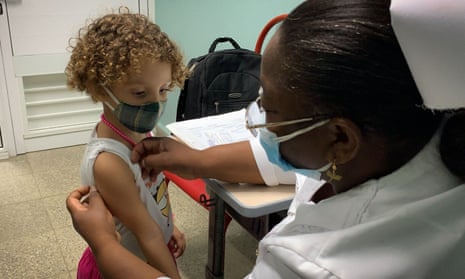The Swedes have rejected it, Dr Fauci says the US may soon approve it, the Chinese have started, but the Cubans have already vaccinated almost all young children against Covid.
The island is the only country vaccinating toddlers as young as two against the disease, and more than 95% of two- to 18-year-olds have now been fully vaccinated, according to the ministry of public health.
“Although Covid hits children less severely, they are an important factor in transmission,” said Dr Gerardo Guillén, the lead developer of Abdala, one of the island’s homegrown vaccines.
Child vaccination, one of the world’s highest Covid vaccination rates and high herd immunity after a massive Delta peak last summer, he said, have contributed to significantly lower infection rates in Cuba than in the US and Europe throughout the Omicron wave.
With confidence in the community-based health service high – and with a one-party state preventing anti-vax movements from taking root as they have elsewhere in Latin America – Cubans by and large trust their country’s vaccines. Inoculating young children is widely seen as common sense.
“Children are vaccinated as soon as they are born,” said Ania Ramírez, 33, collecting her fully vaccinated son, Fabio, age five, from school. “If he’s already got all the other vaccines, why wouldn’t I put this in him?”
Around the world, Covid vaccination ages are getting lower: the World Health Organization has recommended that if high levels of coverage have already been achieved in the adult population, countries should consider inoculating children as young as five with the Pfizer/BioNTech vaccine. Chile and the United Arab Emirates are now vaccinating three-year-olds.
But some countries are bucking the trend: the Swedish health agency last week decided against recommending Covid vaccines to children younger than 11, arguing there were no “clear benefits”.
Experts say that there are benefits to vaccinating young children, but concerns remain.
Dr Jon K Andrus, former regional immunization programme director at the Pan American Health Organisation and professor of public health at George Washington University, said that while Cuban scientists “make good quality vaccines”, he was wary of seeing children vaccinated before he had more information.
“None of the results have been published in peer-reviewed journals, so it’s hard to discuss,” he said.
Cuba’s vaccines, he said, are based on a platform “that has been used for decades on tetanus. It’s great technology, but you need the data because there might be an unexpected side-effect for this disease.”
Cuban scientists say that phase I and II trials of Soberana 2 and Soberana Plus vaccines in 350 children aged between three and 18 found no serious adverse effects. Trial data, they say, has been sent to peer-review journals and is pending publication. Health officials say that in the coming weeks, all trial data will be sent to the World Health Organization, as they request export approvals.
Dr Peter Hotez, dean of the National School of Tropical Medicine at Baylor College of Medicine in Texas, said that vaccination of young children “is essential” given the record number of kids in the US hospitalised with Omicron. But he emphasised the importance of strong public health communication.
“The vaccine ecosystem is fragile,” he said. “If you get it wrong, especially with someone’s child, it can have spillover effects and derail other vaccine programmes.”
He pointed to the Philippines, where a botched rollout of a new dengue vaccine in 2016 led to a widespread public perception that the vaccine was harmful. The consequence of that was a loss in public confidence in other child vaccines – resulting in a measles epidemic that killed hundreds.
Dr Jerome Kim, director general of the International Vaccine Institute, a non-profit based in Seoul, said it “makes sense” to vaccinate young children, primarily to protect family members around them. “If the mum and dad are working, it’s often grandma and grandpa who take care of the child after school,” he said.
He also emphasised the role that child vaccination can play in reducing poverty: data indicates that globally, for every dollar spent on vaccination, 44 dollars are saved in indirect costs.
“It’s not only the direct cost of hospitalization that you save, but you save costs related to parents having to stay home,” he said.
